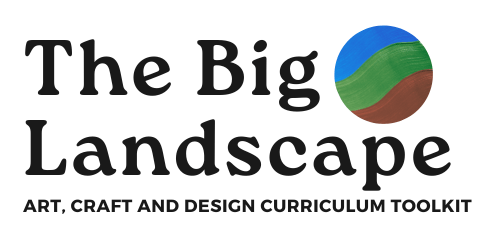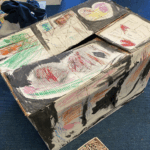KnowledgeFacts, information, and skills acquired through experience or education; the theoretical or practical understanding of a subject. is a formForm refers to three dimensional objects. While shapes have two dimensions (height and width), forms have three dimensions (height, width and depth). The overall unity... of awareness or familiarity to better understand or be informed about the subject matterThe content of art is the meaning, message, and/or feeling imparted by a work of art. Content is inextricably linked with form, which refers to... (knowing).
Being clear about knowledge is essential to organise learning, inform planning and how we set out our curriculumIn education, a curriculum (or curricula) is broadly defined as the totality of student experiences that occur in the educational process. The term often refers specifically to a planned.... The acquisition of knowledge and (applied) skillsTechniques and attributes acquired through learning, engagement and practice are considered by some artArt refers to a diverse range of human intellectual and expressive activities and the outcomes of those activities. Within this context art is further defined... educators as the foundation of any learning experience.
There are also competing ideas about knowledge and knowing, which question how best we might organise knowledge into ‘domains’ to clarify the different knowledge functions.
Historically, art educators have assumed that knowledge is fundamentally factual or theoretical, but within more practical and applied learning contexts, we understand that knowledge can be acquired experientially.
Not all knowledge is taught as facts, most is modelled, guided and built through makingThe process of making or producing something. The making of meaning is a decisively integral component of art-making. Meaning-making in relation to the creation of... and doing.
However, this does require art educators to signpost, clarify and communicate what the knowledge is. In order to develop reflection and metacognition, make explicit the understanding that has been gained following the learning experience.
UK art, craftCraft can be designed as intelligent making. It is technically, materially and culturally informed. Craft is the designing and hand making of individual objects and... and designDesign shapes ideas to become practical solutions and propositions for customers and users. Design is all around us, everything man made has been designed. The... subject curricula place great emphasis on developing students' knowledge and understanding. For example, the National Curriculum for Art and Design in England sets out learning objectives and skills for students to acquire across each key stageA key stage is a stage of the state education system in England, Northern Ireland and the British Overseas Territory of Gibraltar setting the educational... and learning phaseEach stage of learning is crucial in its own way. The 3 stages of learning — cognitive learning, associative learning, and autonomous learning— are proven....
These objectives are aimed at developing students' knowledge and understanding of techniquesA procedure, formula or routine by which an outcome or artwork is achieved, to include weaving thread into cloth with a darning needle, carving wood..., materialsThe resources that artists, craftspeople and designers use to create work, to include thread, plastic, stone, wood, clay, paint and paper, processes and works of art and design.
Students are encouraged to explore their personal interests, and artistic styles and embrace cultural diversity through their work.
The curriculum provides opportunities for students to develop essential skills such as critical thinkingThe ability to reason, ask questions, debate and challenge what is presented to you. and problem solving, preparing them for future learning and careers in the arts. Hence, experiential and practical knowledgePractical knowledge may be defined tentatively as the form of knowledge involved in exercising a skill. It is the 'knowing how'. becomes as highly regarded as the theoretical knowledgeTheoretical knowledge is the cultural and contextual content that pupils learn about artists and artwork. informing it.
This subject knowledge is ‘powerful’, enabling students to function confidently and successfully in subject-specific ways.
Powerful knowledgePowerful knowledge refers to what the knowledge can do or what intellectual power it gives to those who have access to it. his knowledge is specialised knowledge... is promoted by the sociologist Michael F. D. Young, who makes the case for ‘specialised’ knowledge, as it functions within a subject (Young, 2008).
For example, knowledge of drawingThe art of representing object and forms on a surface chiefly with the use of line and with pencils, crayons, pens and a variety of... mediaDifferent materials used by artists, such as paint, charcoal, clay and thread. Media is the plural of MEDIUM. In this context, it refers to the...; paper surfaces; lineLines are used by artists and designers to describe objects, add detail or create expression. Lines define an artwork and reveal the artist’s techniques. Line... and tonal qualities; shading techniques; and the conscious (meta) control of our own mark-makingMaking as wide a variety of dots and lines of differing size, shape and density as you can invent abilities.
Applying these can contribute to better drawing outcomes, with deeper levels of engagement and understanding. The structure of art and design as a processA series of actions, changes or operations performed in the making or creating of a product or outcomes. The procedures that one goes through in... and experiential subject, means that students acquire knowledge and learn mostly by making and doing.
Four Knowledge Domains for Informing Learning:
- EXPLICIT – Know What (facts & theoryA theory of art is intended to contrast with a definition of art. Traditionally, definitions are composed of necessary and sufficient conditions and a single counterexample...)
- TACIT – Know How (experiential learningExperiential learning is the process of learning through experience, and is more narrowly defined as 'learning through reflection on doing'. Hands-on learning can be a...)
- CONCEPTUAL – Know About (critical & contextual, aestheticsA term used to explore and explain the look and sensual appeal of a work of art, craft or design. The term embraces aspects of..., other cultures)
- AFFECTIVE - Know Self (self-perception, reflection, metacognition, motivation, feelings & emotions, making meaning)









